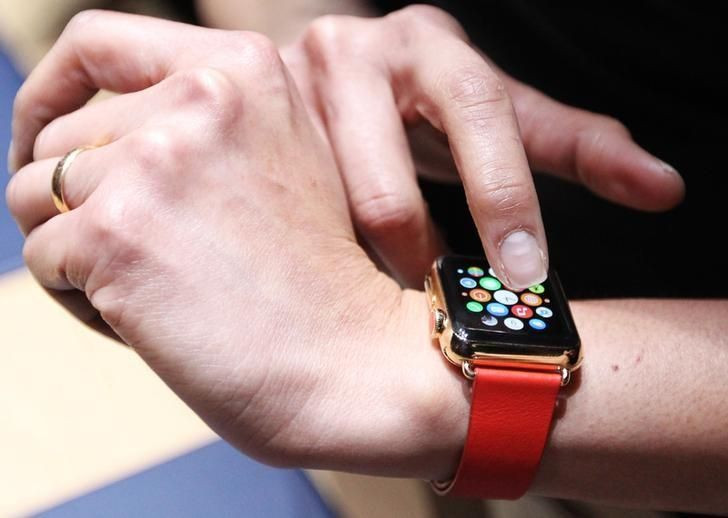Apple Watch Etiquette: As Smartwatches Proliferate, How Not To Be 'That Guy'

For a quick refresher on the importance of good body language, revisit the 1992 town hall-style presidential debate between George H. W. Bush, Bill Clinton and H. Ross Perot. In the span of two seconds, the incumbent President Bush made what is now regarded as one of the biggest blunders in presidential debate history. He checked his watch.
Pundits and commentators spent weeks analyzing how the gesture made Bush seem disengaged, aloof, uninterested in the concerns of voters. The president, of course, went on to lose the election to the far more engaged Bill Clinton. It’s a reminder that body language matters, and it’s something to keep in mind as Apple Inc. readies the release of its highly anticipated Apple Watch, the company’s first wearable device, which begins pre-orders Friday and goes on sale April 24.
If you’re planning to be one of the first in line to buy the new gadget, etiquette experts urge you to heed the lessons of the one-term President Bush: There’s a time and place for checking your watch, and it’s not during a conversation.
“It signals ‘I’m bored,’ ” said Diane Gottsman, owner of the Protocol School of Texas and a nationally recognized expert on manners. “Even a few seconds is too long when you’re with another person. We always have to be aware at the distraction.”
While that was true with a regular wristwatch, it's doubly true with a smartwatch, which delivers a whole host of new alerts, prods and other tantalizing bits of information pleading for a nanosecond of attention. Forget trying not to look: The minute you even think of looking at that watch, your eyes lose focus, and whoever you happen to be sitting with immediately knows: I'm less interesting than whatever it is that just hit your wrist.
Worse Than Smartphones
Since the cellphone explosion of two decades ago, each new evolutionary shift in mobile technology has made engaging with our devices easier and more convenient, but embracing new technology shouldn’t mean abandoning basic social mores, according to Elaine Swann, a lifestyle and etiquette expert.
“The person face-to-face with us should still have top priority in our lives,” Swann said. “A simple glance to check your email or check to see if a call is coming in, that glance really breaks the line of communication with the person in front of you or the individual you’re engaging with.”
Fortunately, much of the etiquette surrounding mobile technology has already been hashed out. Every group of friends has that one person who won’t stop fiddling with his iPhone at a dinner party or out at a group brunch, but most of us don’t need to be told that too much phone fiddling is considered rude.
The Apple Watch, accessible with just a twist of the wrist, will make it that much more tempting to sneak a glance, but Swann said your friends will know when they don’t have your full attention, even if they don’t say it. “Our phones have paved the way for recognizing that behavior,” she said. “We now know the body language when a person has literally left the conversation. We can identify that now. The same is going to ring true with the watch.”
Shut It Down
The same is also true for one-on-one interactions like business lunches or dates. For instance, if you’re wearing the Apple Watch on a first date, don’t use it to surf Tinder while you’re waiting on the appetizers. And if you’re at a job interview, Gottsman said it’s better to be safe than sorry. “I would turn it off completely,” she said. “You don’t want any of the alerts or the fancy bells and whistles going off. If there was a clock on the wall in the office, I wouldn’t be looking at that clock, just like I wouldn’t be looking at the watch on my arm.”
Whatever your thoughts on smartwatches, you won’t be able to avoid them. Global sales of smartwatches are expected to skyrocket to more than 26 million units this year, up from only 4 million in 2014, according to research from GfK, a retail tracking firm.
Don’t be surprised if our manners take a few years to catch up. Anyone who remembers what dining out was like in the mid-1990s -- before restaurants instituted no-cellphone polices -- will remember the abject horror of being seated next to the bullhorn-voiced Nokia brigade. “With the advent of cellphones, we got worse before we got better,” Gottsman said. “It was new to us. As something becomes the norm, we learn and we adapt and we start to realize how we’re affecting others when we use that device.”
And while we may not all agree on what is and isn’t acceptable behavior, Swann said she doesn’t see technology ever moving us to the point where we sacrifice our innate need for face-to-face connections. “I think we’re always going to have that yin and yang to it,” she said. “There are the ones who are so addicted that they just can’t stop, and then the ones who are saying, ‘This is rude and disrespectful, and I need your time.’ ”
Christopher Zara is a senior writer who covers media and culture. News tips? Email me here. Follow me on Twitter @christopherzara.
© Copyright IBTimes 2024. All rights reserved.




















